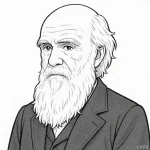“People do not like to think. If one thinks, one must reach conclusions. Conclusions are not always pleasant.”

- June 27, 1880 – June 1, 1968
- American
- Author, educator, human rights activist
table of contents
Quote
“People do not like to think. If one thinks, one must reach conclusions. Conclusions are not always pleasant.”
Explanation
Helen Keller’s quote points to the discomfort that often accompanies critical thinking and the process of reaching conclusions. She suggests that many people shy away from deep thought because it forces them to confront truths or realities that may not align with their desires or expectations. The unwillingness to think deeply stems from the fear that the conclusions reached could be unpleasant or challenge existing beliefs. Keller’s observation highlights how avoiding thought can lead to a life lived without reflection or self-awareness.
Keller’s own life, however, is a testimony to the power of thoughtful reflection and confronting uncomfortable truths. Despite her physical limitations, she was deeply engaged in intellectual and social issues, often challenging societal norms and advocating for the rights of marginalized groups. She did not shy away from the unpleasantness of certain truths but used her mind to bring about change. This quote underscores the importance of facing difficult conclusions in order to foster growth and make informed decisions, even when they are uncomfortable or challenging.
In contemporary society, Keller’s words are especially relevant as they apply to the challenges of navigating complex issues, whether in politics, personal relationships, or global crises. In a world often marked by disinformation, superficial thinking, and quick fixes, Keller’s insight urges individuals to engage in deeper reflection. It suggests that while reaching conclusions may not always be easy or pleasant, it is an essential step toward understanding, problem-solving, and ultimately creating positive change. For example, recognizing the uncomfortable realities of climate change or social inequality is the first step toward addressing and solving these pressing issues.
Would you like to share your impressions or related stories about this quote in the comments section?

